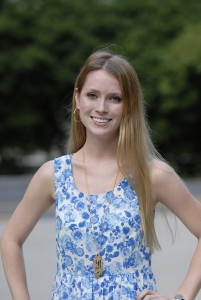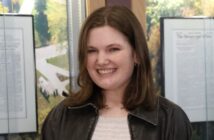Religion fascinates me while also making me nervous. I love hearing people talk about their beliefs, but then as their part of the conversation draws to an end and I have nothing to add in agreement, I wonder, “Where does this leave us?” Where does it leave you and all the people whose beliefs are either different or sometimes even directly contradict what you believe? I am a mental blob of secular uncertainty, and so religion makes me nervous.
However, my love of interesting conversations usually outweighs my fear of how they end, which I why when I saw the soft charcoal edges of a cross outlined on the forearm of Aaron Zacharia, ’16, I wanted to learn about the beliefs that put it there.
A detail I did not notice at first were the letters “JER” followed by the numbers “29:11” at the core of his cross. This combination symbolizes his favorite Bible verse, Jeremiah 29:11, which he recites with the fluid rapidity of someone who truly knows and loves what he is saying, “’For I know the plans I have for you,’ declares the Lord, ‘plans to prosper you and not to harm you, plans to give you hope and a future.’”
“It’s a daily reminder of knowing that God has an eternal plan, that whatever failures might present themselves, it’s not the end of the world,” he says, his friendly personality showing in his blissfully warm and happy smile. “And just trusting the Lord that everything happens for a reason, and everything will be ok.”
Born into the Indian Orthodox Christian religion, he says that he was “raised in the church.” Both of his parents are leaders in his church in Philadelphia, and he has been an altar boy since he was 13 years old. However, his religious legacy and its personal relevance to him reaches much further back into history than his own lifetime.
He explains that over 2,000 years ago, in 52 A.D., St. Thomas, one of the Twelve Disciples, journeyed to southern India to spread the Gospel. The Indian Orthodox Church later emerged as one of the six Oriental Orthodox Churches.
“I find it just heartwarming and comforting that there’s such a strong foundation. It’s hard to put into words,” he says. “It’s so grounded and rooted. The ways and these methods haven’t changed; things haven’t swayed us over the years. Not that we’re not progressive, but we’re not conforming to the ways of the world.”
Along those same lines, he says that religion is a personal decision that people should decide for themselves. He describes that affirming point in his own life as a “spiritual revival.”
When he was 16 years old, he attended a national, Indian Orthodox leadership conference, which is when he first heard the verse that is now tattooed on his arm.
“I came across this verse there, and that started being my first real realization of God,” he says. “My first I’m-not-a-child-following-the-ways-of-my-parents, but I’m actively making the decision for myself to follow in God. It gives me hope.”
At 16, he decided that sometime in the future, when he was legally allowed to get a tattoo, he would get “just a simple cross- nothing too fancy” to represent that message.
During the time between the conference and the moment he got his tattoo last year over winter break, he says, “I definitely questioned the permanence of it, but that was a very small part.” In the end, he says that he was set on getting it.
In between those two significant moments, he also experienced his first couple years of college, continuing to add meaning to his cross by becoming an integral part of Lehigh’s InterVarsity Christian Fellowship.
Just last week, he led the fellowship worship, teaching the group the Malayalam songs that are part of Indian Orthodox Church services.
“One thing about Indian orthodox songs is that they focus a lot on harmonies,” he says. “So there’s the melody, but then with different voices you add on the higher and lower harmonies. When you can hear all the layers to it, it’s just so beautiful.”
He shared with them the memory of one of his favorite services, saying that 12 deacons who had recently graduated seminary school visited his church once, and “having them lead was so beautiful that it felt like I could hear the angels sing along with them.”
As he finishes his train of thought, voices filter in from the surrounding conversations in the STEPS lobby.
On a day like this, where everything balances so delicately between winter and spring, his tattoo is hidden beneath a sweater. Layer upon layer, we sometimes hide away. But sometimes the breadcrumb trails to our inner thoughts are noticed and followed.
Though I don’t say it then, I think I understand what he means by the beauty of harmony, even if I can’t quite hear the angels.






Comment policy
Comments posted to The Brown and White website are reviewed by a moderator before being approved. Incendiary speech or harassing language, including comments targeted at individuals, may be deemed unacceptable and not published. Spam and other soliciting will also be declined.
The Brown and White also reserves the right to not publish entirely anonymous comments.